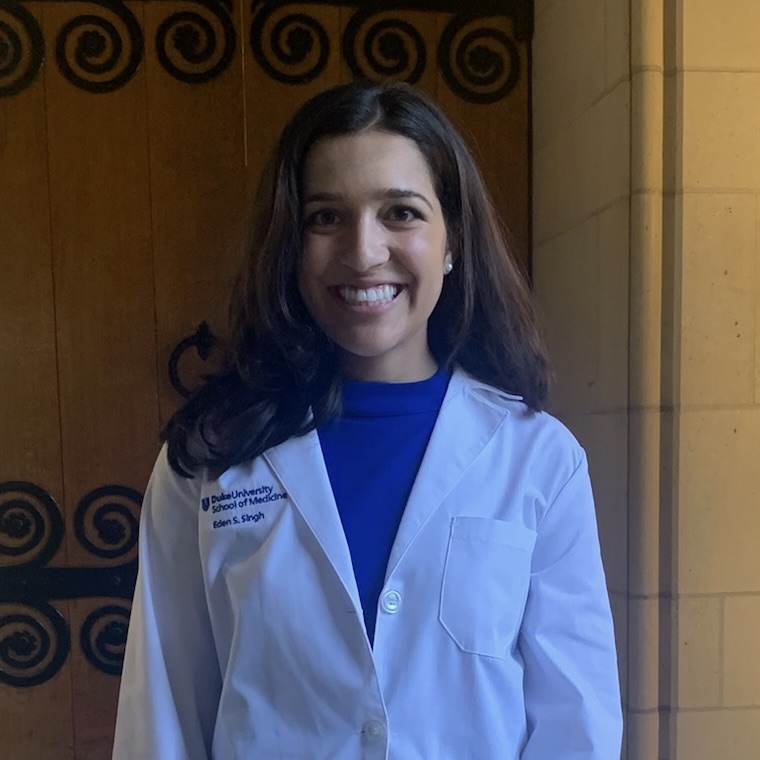April 1, 2025. By Eden Singh.

Did you know that in just a few clicks on your computer that you can connect individuals with resources in North Carolina related to food, housing, income, and transportation insecurity? This is made possible by the NCCare360 platform and through new initiatives with NC Medicaid.
As a medical student and a NC Schweitzer Fellow, I work with high-risk older adults who are undergoing surgery and see first-hand the role social factors can have on their health. That is why my Schweitzer partner and I are connecting them to community resources to meet their food, housing and transportation needs. Through this experience, I have learned about the variety of different resources available within our state. I also have simultaneously realized that many are unaware of these resources, or how they can be utilized to be support our community.
It is estimated by the World Health Organization that 30-55% of a person’s health outcomes are determined by social determinants of health (SDOH). SDOH are defined by the Center for Disease Control and Prevention as the “non-medical factors that influence health outcomes” and more specifically, “are the conditions in the environments where people are born, live, learn, work, play, worship, and age.” SDOH have important implications for the wellbeing of individuals.
North Carolina has made significant progress in creating resources to address SDOH for individuals in our state. However, there is need to increase awareness of these tools. NCCare360 is a platform that aggregates resources within the state related to benefits navigation, clothing and household goods, employment, education, entrepreneurship, food assistance, housing and shelter, income support, individual and family support, legal, mental/behavioral health, money management, physical health, social enrichment, sports and recreation, substance use, transportation, utilities, and wellness. Through the platform community members can either find resources on the resource directory site or fill out the assistance request form. The secure assistance request form allows for individuals to be connected directly with one of the network partners related to their identified need(s), who will then make three attempts over ten business days to contact them. There also are resource navigators that can help individuals with more complex needs. Organizations can even join the site as a referring organization, a receiving referrals organization, or both. This allows for community organizations to access more information about the referral process. It is simple to join and is free.
Additionally, individuals who are currently receiving North Carolina Medicaid and have a Medicaid standard plan, a tailored plan, or the EBCI tribal option quality for free rides to and from medical appointments, to pick up prescriptions, mental health appointments, and substance use treatment. Furthermore, there is currently the healthy opportunities pilot program which exists within 33 counties and can be used for individuals with Medicaid who have at least one qualifying physical or behavioral health condition and one qualifying social risk factor. This program provides housing services and support such as move in support and inspections for housing safety and quality, increased transportation services, and food services including food and nutrition classes, fruit and vegetable prescriptions, and medically tailored food delivery.
How can you help individuals in our community take advantage of these programs?
- Screen for SDOH! These may come up naturally in conversation, but there also are screening forms available, such as the American Academy of Family Physicians Social Needs Screening Tool or the Accessing Circumstances and Offering Resources for Needs (ACORN) screener for VA patients, which can screen individuals with just a few questions.
- Provide community members with the link for the resource directory or assistance request form on NCCare360, or help patients sign up in clinic.
- If individuals have Medicaid, encourage them to see if they qualify for transportation, housing, and food support.
- Share these resources!
Taking the time to address SDOH only takes a few minutes but can have profound effects on an individual’s health. There are many opportunities and programs that currently exist within North Carolina that can address SDOH, so it is important to increase awareness of these opportunities to improve the health of our state.
Eden Singh
2024-2025 NC Schweitzer Fellow
Duke School of Medicine, Class of 2026
The opinions expressed are the author’s own.
